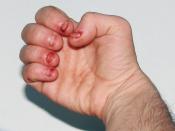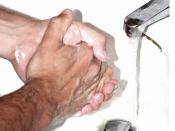We have all felt the effects of stress at one time or another. Our bodies tell us when we are overloaded and when to slow down. If stress continues unchecked, it can develop into a more serious problem called anxiety. It has been estimated that over 20 million Americans suffer from a type of anxiety disorder and another 30 million will experience the problem at least once during their lifetime (Hunt, 2005). Anxiety, essentially, is a normal reaction to stress. Slight anxiety can be motivating; it can motivate us in school or at work to perform better and achieve our goals. However, high levels of anxiety are detrimental and often require medical attention. Individuals affected with this disorder experience an inappropriate and excessive arousal which is often followed by the feeling of uncertainty, fear, and apprehension. Consistent stress and anxiety can greatly affect our spirit, making life seem less meaningful.
There is no one theory of anxiety that would explain the various clinical and biological data. Many theories have suggested possible etiological factors in the development of anxiety; the three main theories are psychodynamic, behavioral, and biological (Hansell and Damour, 2005).
Freud proposed that anxiety is the result of unconscious psychic conflicts. When these conflicts, or forbidden impulses, threaten to become conscious, anxiety is experienced. Anxiety then becomes a signal to the ego to take defensive actions to suppress it. When the defense mechanism is successful, anxiety is lowered and a sense of security returns. However, if the conflict is intense and the defense mechanism is not successful, symptoms will display such as phobias, regression or ritualistic behaviors.
Behavioral theory suggests that anxiety is a result of learned or conditioned responses. Techniques utilized in the treatment of phobias and obsessive-compulsive behaviors support this theory. According to this hypothesis, anxiety results...


